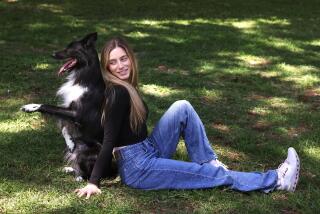Donald McKayle: Dancing to Own Tune
- Share via
About 46 years ago in New York City, Donald McKayle went to a dance concert with a friend. The rest, as they say, is history.
“It was a chemical reaction,” he recalled. He turned to his friend, a dance student, “and said, ‘I want to do that.’ We went to her apartment, pushed the furniture aside, and I got my first lesson.”
Since then, McKayle, 60, has danced on Broadway and directed, choreographed and written for film, television and the concert stage from Los Angeles to Israel.
His more than 100 credits include “Sophisticated Ladies,” “Bedknobs and Broomsticks,” “The Jazz Singer” and “The Ed Sullivan Show.” He has received six Tony and Emmy nominations, a Capezio Award, an NAACP Image Award and a Dramalogue Critics Award.
Today, the UC Irvine professor of dance leads a bi-coastal life of teaching, traveling and helping to create ballets and concerts.
“I started early inventing ideas to take what I was studying in school into the creative area,” McKayle said. For example, when he studied equatorial Africa in elementary school, he decided to make the veldts, the animals and the jungle, a vivid collage that “sprawled all over” the floor of his room, he said.
McKayle, the son of a mechanic and a seamstress, attended City College and a dance school. He went on to dance with the companies of Martha Graham and Anna Sokolow. By 1951 he was working in television, and in 1969 he moved his permanent home to Los Angeles to do TV, still frequently flying back to New York for Broadway shows.
Two years ago, he came to UC Irvine (“They courted me very nicely,” he said, laughing) and subsequently moved to a home in Laguna Beach, where he built a pond with koi and waterfall to relax each morning. “I sit there and think of nothing else,” he said.
One of McKayle’s favorite projects has been his involvement with the American Dance Festival, a group of choreographers and dancers based in North Carolina, which grew out of the lack of understanding of black tradition in modern dance. Through the festival, McKayle staged productions with dance companies around the nation, showing the talent to be found in America, he said.
“There is a lot of discussion of is there black dance, and as many anwers as people who speak of it. . . . Yes, there is black dance. If you go back to African-American folk tradition, you can define black dance. It’s a voice that speaks to the past.”
McKayle, whose parents were Jamaican, said he has had some small battles because of his race, but, “I had so much positive reinforcement (as a child) that I can weather those things. The resolve makes you strong.
“When people said they weren’t hiring Negroes, I said, ‘I’m good and you gotta see me dance.’ Afterward, they would applaud. I was a superb dancer, I must say, but I’ve always been interested in creating.”
More to Read
The biggest entertainment stories
Get our big stories about Hollywood, film, television, music, arts, culture and more right in your inbox as soon as they publish.
You may occasionally receive promotional content from the Los Angeles Times.










